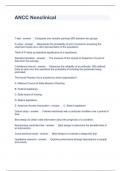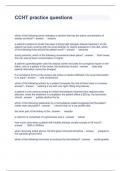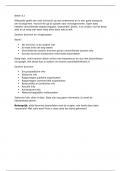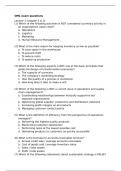Brain Disorders
Gezondheid & leven
Minor: Biomolecular sciences – track Neuroscience
Claire Snel
Gezondheid & leven jaar 3
,Table of contents
Lecture 0 Introduction course .......................................................................................................................... 2
Lecture 1 Etiology of mental traits and conditions ........................................................................................... 3
Lecture 2 Depression part 1 & 2 ..................................................................................................................... 11
Lecture 3 Etiology of brain disorders .............................................................................................................. 18
Lecture 4 Depression part 3............................................................................................................................ 22
Lecture 5 General mechanisms in neurodegeneration ................................................................................... 29
Lecture 6 Dementia ........................................................................................................................................ 38
Dementia 1: Alzheimer’s disease ...................................................................................................................... 38
Dementia 2: Frontotemporal dementia............................................................................................................ 43
Lecture 7 Synucleopathies/ Prion and prion-like disease................................................................................ 49
Part 1 Synucleopathies ..................................................................................................................................... 49
Part 2 Prion and prion-like disease ................................................................................................................... 55
Lecture 8 Stem cell technology in neurodegenerative disease ....................................................................... 60
Lecture 9 Therapy 1 ........................................................................................................................................ 64
Lecture 10 Therapy 2 +3 ................................................................................................................................. 69
Part 1 Therapy 2: targeting amyloid beta in Alzheimer’s disease .................................................................... 69
Part 2 Therapy 3: disease modifying therapy with the UPR as target .............................................................. 76
Lecture 11 The 100+ studies ........................................................................................................................... 82
Lecture 12 Schizophrenia ............................................................................................................................... 86
Part 1 Dopamine and glutamate hypothesis .................................................................................................... 86
Part 2 Thalamic Filter ....................................................................................................................................... 91
Part 3 Genetic and environmental risk factors ................................................................................................. 92
Lecture 13 ADHD ............................................................................................................................................ 94
Part 1 ................................................................................................................................................................ 94
Part 2 ................................................................................................................................................................ 97
Lecture 14 Neurodiversity ADHD/ ASD ......................................................................................................... 102
Lecture 15 Bright side of mental illness ........................................................................................................ 104
Part 1 Creativity & Psychiatric conditions....................................................................................................... 104
Part 2 Neurobiology of Resilience ................................................................................................................... 109
1
,Lecture 0 Introduction course
Week Lecture Datum
Week 1 L1: Etiology of mental traits and 02-11-22
conditions
L2: Depression part 1,2 Whenever you want
L3: Etiology of brain disorders (paper 04-11-22
discussion)
L4: Depression part 3 04-11-22
(L4: brain basics (necessary knowledge
for course, not actively part of exam))
Week 2 L5: General mechanisms in 09-11-22
neurodegeneration
L6: Dementia 10-11-22
L7: Synucleopathies/ prion and prion-like 11-11-22
Week 3 L8: Stem cell technology in 16-11-22
neurodegenerative disease
L9: Therapy 1 16-11-22
L10: Therapy 2+3 17-11-22
L11: 100+ study (guest lecture) 17-11-22
L12: ADHD (same as in brein & 18-11-22
maatschappij) PRERECORDED
L13: ADHD & ASD neurodiversity (same as 18-11-22
in brein & maatschappij) PRERECORDED
Week 4 Intro literature assignment 22-11-22
Literature review assignment part 1 22-11-22 > DEADLINE
literature key references
L14: Schizophrenia 23-11-22
Literature review assignment 23-11-22
L15: Bright side of mental illness
Deadline literature review – backbone 24-11-22
Week 5 MC-exam 02-12-22
Week 6-8 Literature review > no obligatory
meetings anymore
Deadline literature review 23-12-22
2
,Lecture 1 Etiology of mental traits and conditions
Trait (eigenschap) or disorder?
- Impulsivity, mood, (anti) social behavior, stress-sensitivity, resilience and vulnerability are
behavioral traits
- Each trait exists along a spectrum
- Impulsivity (extremely thoughtful, difficulties decision taking – extremely impulsive)
- Border between normal and abnormal behavior?
- A variation or a disorder?
- Other traits: IQ, extraversion, blood pressure…
- Disorders: diabetes, obesitas, autism (?), depression, schizophrenia
- HOW do traits and disorders arise in general?
Which factors can contribute to traits / (mental) characteristics and brain
disorders?
➢ Genes
➢ Environmental factors
Nature – nurture discussion
• Past: tendency to explain disease via ‘nurture’ concept (je ontwikkelt jezelf door sociaal
economische factoren)
• Autism = ‘refrigerator mother’ (autism occurs because of the behavior of the mother)
>> not true
• Homosexual orientation = overly present mother (not true)
• These ideas are no longer valid
• Later: the role of biological factors more clear (‘nature’) (DNA and genes influence the
development)
Etiology
- Classic nature – nurture discussion:
- Hard reductionism: ‘all psychiatric illness is best explained solely in terms of molecular
neuroscience’ > not correct
- Etiological models for psychiatric disease need to be pluralistic or multilevel (= complicated
phenomena you can explain not only by biological factors but also social and cultural factors
etc)
o Best understood from biological, psychological, and sociocultural, economic
perspectives
Break down dichotomy between nature-nurture, but view brain as in constant interaction with
environment, society and culture via plasticity
• Most brain disorders complex,
Etiology
multifactorial disorders
- Complex puzzle
• Both genetic and environmental
- Genes
factors involved in etiology
- Environmental factors
• Often: complex interactions and
- HOW can environmental factors exert their influence?
causal loops
- Altered gene expression via
– Stress system
– Epigenetics
- Interactions gene-environment
3
,Genes
➢ To study the effect of genes on psychiatric disorders:
➢ From twin + adoption studies: several behavioral traits and psychiatric diseases moderate /
high heritability
o Heritability = proportion of variance in symptoms that is explained by the variance in
genetic factors ( in dutch: de variatie die we zien in het voorkomen van bepaalde
eigenschappen dat we kunnen verklaren door genen)
• Major depression 40-50%, low heritability
• ADHD: 75%, genes play an interesting rol
• Autism, bipolar disorder, schizophrenia around 80%
o Genes play a large role in shaping on the likelihood (kans) of someone getting it and
the degree of severity
In post – ‘human genome project’ era
➢ Expectation: easy to find risk genes
o Contrary: very difficult
o ‘missing heritability’(moeilijk om risicogenen te vinden)
➢ Outcome: model of single / few risk genes =
overly simplistic paradigm (tijdelijke waarheid)
Genes and psychiatry
Classic theory
• Single abnormal gene > abnormal gene product > neuronal malfunction >
mental illness = theory that is overly simplistic
• Single abnormal gene is not sufficient to cause mental disorders
• What is pathway from gene to mental illness?
New explanations, new hypotheses, new models for pathway ‘genotype to phenotype’
1. ‘Complex Genetics’ or ‘Diathesis-Risk Model’ (explained in lecture Etiology)
2. ‘Differential Susceptibly to Environment Hypothesis’ (explained in lecture ‘Neurobiology of
Resilience’)
3. ‘Balancing Selection Hypothesis’ (explained in lecture ‘Bright side of mental illness)
- New hypotheses and new models are more complex
- New ways of doing research and ‘unravel’ these pathways from ‘genotype to phenotype’:
‘endophenotype approach’ (tussen phenotype en genotype)
• Stress – diathesis (risico) model (diathesis = ‘risk’)
= Predisposition (genetic) + environmental stress > gives a larger probability at disease
New paradigm:
➢ Hypothesis: mental illness is caused by multiple small contributions from several genes, all
interacting with environmental stressors
‘Complex genetics’= complex set of risk factors (& environmental factors) that bias (meer kans
geven op) a person toward illness but do not cause it (inherits risk not disease)
• Reaching tipping point: high probability developing disorder
>> Concept also applies to hypertension, obesitas, diabetes…
4
, Endophenotype approach
• Path from gene > mental illness
• New ways of doing research and ‘unravel’ these pathways
from ‘genotype to phenotype’: ‘endophenotype approach’
• Pathway ‘genotype to phenotype’
MUCH MORE COMPLEX!
SOLUTION:
Important intermediaries between gene (genotype) and
disease/behavior (phenotype)
‘endophenotypes’:
• Measurable, inheritable and closely linked to disease
• More precisely measurable than illness
• Two types:
– Biological endophenotypes
– Symptom/system endophenotypes
Genes and psychiatry
1. Biological endophenotypes (more close to genotype)
- Measurable biological phenomena
– Electrophysiological response to startle
– Neuroimaging response to information processing
– Activation of certain brain circuit
2. Symptom/system endophenotypes (more close to phenotype)
- Single symptoms associated with mental illness:
– Insomnia
– Executive dysfunction > prefrontale hersenkwab werkt niet goed
– Hallucinations
– Poor fear conditioning
– Anhedonia > inability to experience pleasure (measure with a questionaire)
→ Gene > molecules > circuits > information processing (biological phenotype) > single
symptom (system endophenotype) > full syndrome of mental disorder
→ Closer to gene on pathway > more readily linked to gene: Link gene to endophenotype
easier than to disease
→ Genes only loosely linked to psychiatric disorders, therefore hard to identify
Psychopathology and brain circuits
- Etiology of psychiatric disorders is moving beyond single molecule explanations/ receptors,
enzymes and other molecules as causes for mental illness
- New paradigm: psychiatric symptoms are increasingly linked to malfunctioning specific brain
circuits
- Genes + environmental risk factors conspire to produce inefficient information processing in
neuronal circuitry
- Brain imaging > focus on brain circuits
5








